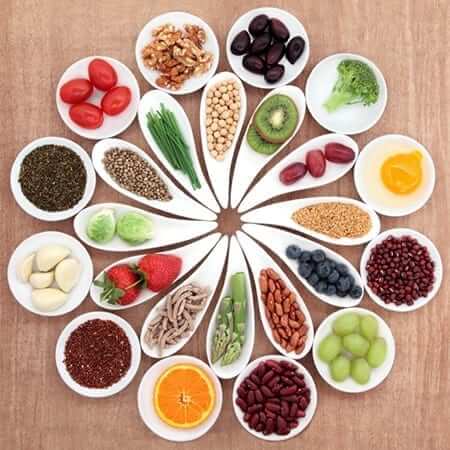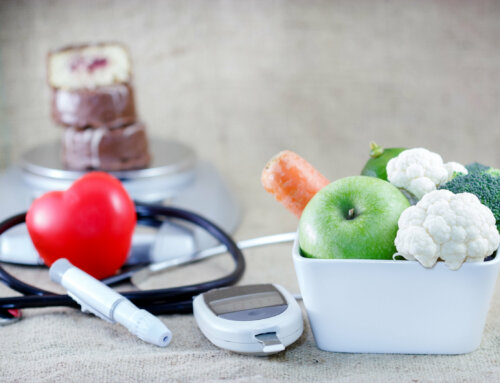Each assessment done for our diabetes self management skills program requires a complete food history – including the speed of one’s eating: “Do you eat quickly/fast, normal speed or slowly?” I have asked this question to approximately 2,000 patients in the last three years. Since we are preparing for program re-accreditation, I found that approximately 70% of the patients answered “Fast”! How do they decide what fast is? They usually say that they were the first person finished at the table and were already reaching for a second helping.
Another part of the diabetes assessment asks about food choices and selection. One specific question is “What did you eat last night for dinner?” The statistics show that more than 50% of patients do not remember what they had eaten the night before. I am certain that this has nothing to do with dementia or memory issues. It seems that people have forgotten about “mindful eating”, or really being aware of the whole experience. We tend to rush from place to place, eat breakfast (if at all) in the car, lunch at our desk surrounded by endless projects, and dinner watching television, answering the phone, or catching up on emails. One of the reasons the obesity epidemic exists is a tremendous amount of people eat quickly, without thought, or planning. The other extreme is when people are constantly watching every morsel of food they eat, constantly weighing and measuring, but do not actually enjoy the food or the total experience. Either of these situations do not lead to a healthy relationship with food or offer any joy in eating. Cost could be another factor, which may lead to the lack of food enjoyment. Healthy foods tend to be pricier, but there are many ways to incorporate good choices into our diet without breaking the budget.
Since proper eating is such a huge part of diabetes treatment and counseling, I thought it was a good idea to review some ways to stay connected to the overall eating experience in a positive way.
Try implanting any of these 7 tips into your meal plan:
- Think only about improving one meal at a time – It is difficult to make huge changes in behavior at once, so as long as you are not skipping meals, you can do this gradually. Choose one specific meal a day. For instance, you can plan ahead by shopping and cooking all your dinners on the weekend so you are not thrown into food preparation after a long day: this often leads to running to a fast food drive-through instead of cooking a meal. Freeze the food into individual meals and just microwave when you get home. This is also an excellent technique for instant portion control. If you usually skip breakfast or eat on the run, get up 20 minutes earlier and enjoy the entire experience. I like to be the only one up in the morning (5:30am) brewing coffee and eating breakfast in silence. I do love sleep, but I love eating breakfast in peace even more! If you plan ahead and pack your lunch, you will not have to rush to pick up fast food and eat in the car or back at your desk. It is still summer with pleasant weather, so take your prepared lunch outside and sit at the park or just change up the scenery in another part of the office. This can help you focus on the food, the enjoyment, and the experience. This is called “mindful eating”. Taste the food, chew the food slowly and pay attention to the color, texture, and aroma. This will slow you down and eventually help you eat less. Try to pay more attention to each meal until you are able to achieve this with all your daily meals. Snacks can be eaten on the run, but stick to a rule of 100 calories, which can help prevent over-snacking. Always carry wise choices – including peanut butter or cheese crackers, popcorn, or fruit so you can avoid the vending machine when you are stressed and starving.
- Consider every meal to be a special meal – We tend to make more time and savor the food on holidays (including Thanksgiving, Christmas, and Easter). Treat every meal as an event or an occasion, which will help you focus more, slow your eating, and remember the experience. The food does not have to be extravagant, even simple food can taste wonderful when we make the time.
- Take your time – Eating fast seems to be very common. This is one experience worth slowing down for – especially when you have diabetes. We only taste the first few bites and then our taste buds no longer differentiate. Savor those first few bites. Put your fork down, cut your food one piece at a time, or take sips of water between bites. Eating should not be a race.
- Think about and enjoy the setting – Little tips include using white plates were you can really see and recognize the colors and amount of food. Use candles, cloth napkins, flowers and soft music to add to the experience. Use salad dishes and take only one serving, but really enjoy and focus on that food. Serve “cocktails” as simple as lemon or orange slices in water but put them in your special wine glasses. It may sound over the top for a Wednesday night dinner, but it can have an impact on “being and eating mindful”.
- Ignore the hectic surroundings – Everyone seems to be on auto pilot and multi-tasking is considered the norm. Try to forget about what’s on TV, reading, writing, bill paying, or talking on the phone and concentrate on the food. Put away the clutter and computer and make at least 20 minutes of time that is uninterrupted to eat and enjoy your meal.
- Make it an adventure – It used to be difficult to find a Farmer’s Market or locally grown foods. Today there seems to be a fresh market, especially during summer season, almost everywhere. Shop there for new and exotic fruits and vegetables along with different spices – including Asian or Indian – which are full of nutrients and flavor.
- Cost should not be a factor – It would be wonderful if everyone could afford the finest ingredients, but that is not the case. With creativity and motivation, a few frozen vegetables with a can of beans and tilapia can be a great meal when spiced right. You can learn to savor and respect the simplest meal.
It sounds crazy that over half the patients could not remember what they ate yesterday! Try not to let this happen to you by being aware and really enjoying your eating experience. It can be difficult to make time for mindful eating, but work towards a goal. Change does not come easily, but these tips may help you make better choices and slow you down. All this should certainly improve with your diabetes control!
NOTE: Consult your Doctor first to make sure my recommendations fit your special health needs.







These are such important issues about how to eat, and the right way to
enjoy your food. I would like to add that I have tried many of these
numbered ideas and solutions, and they are successful and so needed.
Dr. Kleinman is always providing us with beneficial ideas and solutions
to our problems as Diabetics. . Thank You Doctor.